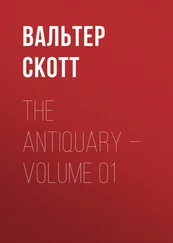Вальтер Скотт - Waverley Novels — Volume 12
Здесь есть возможность читать онлайн «Вальтер Скотт - Waverley Novels — Volume 12» — ознакомительный отрывок электронной книги совершенно бесплатно, а после прочтения отрывка купить полную версию. В некоторых случаях можно слушать аудио, скачать через торрент в формате fb2 и присутствует краткое содержание. Жанр: foreign_antique, foreign_prose, Альтернативная история, на английском языке. Описание произведения, (предисловие) а так же отзывы посетителей доступны на портале библиотеки ЛибКат.
- Название:Waverley Novels — Volume 12
- Автор:
- Жанр:
- Год:неизвестен
- ISBN:нет данных
- Рейтинг книги:5 / 5. Голосов: 1
-
Избранное:Добавить в избранное
- Отзывы:
-
Ваша оценка:
- 100
- 1
- 2
- 3
- 4
- 5
Waverley Novels — Volume 12: краткое содержание, описание и аннотация
Предлагаем к чтению аннотацию, описание, краткое содержание или предисловие (зависит от того, что написал сам автор книги «Waverley Novels — Volume 12»). Если вы не нашли необходимую информацию о книге — напишите в комментариях, мы постараемся отыскать её.
Waverley Novels — Volume 12 — читать онлайн ознакомительный отрывок
Ниже представлен текст книги, разбитый по страницам. Система сохранения места последней прочитанной страницы, позволяет с удобством читать онлайн бесплатно книгу «Waverley Novels — Volume 12», без необходимости каждый раз заново искать на чём Вы остановились. Поставьте закладку, и сможете в любой момент перейти на страницу, на которой закончили чтение.
Интервал:
Закладка:
"You apprehend me not," said the Acolyte, hastily; "you mistake my meaning. He is a man from whom, if he pleases to converse with such as you, you may derive much knowledge; keeping out of the reach of those pretended secret arts, which he will only use to turn thee into ridicule." With these words, which he himself would perhaps have felt it difficult to reconcile, the leader and his follower parted.
CHAPTER THE NINTH
Between the foaming jaws of the white torrent,
The skilful artist draws a sudden mound;
By level long he subdivides their strength,
Stealing the waters from their rocky bed,
First to diminish what he means to conquer;
Then, for the residue he forms a road,
Easy to keep, and painful to desert,
And guiding to the end the planner aim'd at.
It would have been easy for Alexius, by a course of avowed suspicion, or any false step in the manner of receiving this tumultuary invasion of the European nations, to have blown into a flame the numerous but smothered grievances under which they laboured; and a similar catastrophe would not have been less certain, had he at once abandoned all thoughts of resistance, and placed his hope of safety in surrendering to the multitudes of the west whatsoever they accounted worth taking. The Emperor chose a middle course; and, unquestionably, in the weakness of the Greek empire, it was the only one which would have given him at once safety, and a great degree of consequence in the eyes of the Frank invaders and those of his own subjects. The means with, which he acted were of various kinds, and, rather from policy than inclination, were often stained with falsehood or meanness; therefore it follows that the measures of the Emperor resembled those of the snake, who twines himself through the grass, with the purpose of stinging insidiously those whom he fears to approach with the step of the bold and generous lion. We are not, however, writing the History of the Crusades, and what we have already said of the Emperor's precautions on the first appearance of Godfrey of Bouillon, and his associates, may suffice for the elucidation of our story.
About four weeks had now passed over, marked by quarrels and reconcilements between the crusaders and the Grecians of the empire. The former were, as Alexius's policy dictated, occasionally and individually, received with extreme honour, and their leaders loaded with respect and favour; while, from time to time, such bodies of them as sought distant or circuitous routes to the capital, were intercepted and cut to pieces by light-armed troops, who easily passed upon their ignorant opponents for Turks, Scythians, or other infidels, and sometimes were actually such, but in the service of the Grecian monarch. Often, too, it happened, that while the more powerful chiefs of the crusade were feasted by the Emperor and his ministers with the richest delicacies, and their thirst slaked with iced wines, their followers were left at a distance, where, intentionally supplied with adulterated flour, tainted provisions, and bad water, they contracted diseases, and died in great numbers, without having once seen a foot of the Holy Land, for the recovery of which they had abandoned their peace, their competence, and their native country. These aggressions did not pass without complaint. Many of the crusading chiefs impugned the fidelity of their allies, exposed the losses sustained by their armies as evils voluntarily inflicted on them by the Greeks, and on more than one occasion, the two nations stood opposed to each other on such terms that a general war seemed to be inevitable.
Alexius, however, though obliged to have recourse to every finesse, still kept his ground, and made peace with the most powerful chiefs, under one pretence or other. The actual losses of the crusaders by the sword he imputed to their own aggressions — their misguidance, to accident and to wilfulness — the effects produced on them by the adulterated provisions, to the vehemence of their own appetite for raw fruits and unripened wines. In short, there was no disaster of any kind whatsoever which could possibly befall the unhappy pilgrims, but the Emperor stood prepared to prove that it was the natural consequence of their own violence, wilfulness of conduct, or hostile precipitancy.
The chiefs, who were not ignorant of their strength, would not, it was likely, have tamely suffered injuries from a power so inferior to their own, were it not that they had formed extravagant ideas of the wealth of the Eastern empire, which Alexius seemed willing to share with them with an excess of bounty as new to the leaders as the rich productions of the East were tempting to their followers.
The French nobles would perhaps have been the most difficult to be brought into order when differences arose; but an accident, which the Emperor might have termed providential, reduced the high-spirited Count of Vermandois to the situation, of a suppliant, when he expected to hold that of a dictator. A fierce tempest surprised his fleet after he set sail from Italy, and he was finally driven on the coast of Greece. Many ships were destroyed, and those troops who got ashore were so much distressed, that they were obliged to surrender themselves to the lieutenants of Alexius. So that the Count of Vermandois, so haughty in his bearing when he first embarked, was sent to the court of Constantinople, not as a prince, but as a prisoner. In this case, the Emperor instantly set the soldiers at liberty, and loaded them with presents. [Footnote: See Mills' History of the Crusades, vol. i, p. 96]
Grateful, therefore, for attentions in which Alexius was unremitting, Count Hugh was by gratitude as well as interest, inclined to join the opinion of those who, for other reasons, desired the subsistence of peace betwixt the crusaders and the empire of Greece. A better principle determined the celebrated Godfrey, Raymond of Thoulouse, and some others, in whom devotion was something more than a mere burst of fanaticism. These princes considered with what scandal their whole journey must be stained, if the first of their exploits should be a war upon the Grecian empire, which might justly be called the barrier of Christendom. If it was weak, and at the same time rich — if at the same time it invited rapine, and was unable to protect itself against it — it was the more their interest and duty, as Christian soldiers, to protect a Christian state, whose existence was of so much consequence to the common cause, even when it could not defend itself. It was the wish of these frank-hearted men to receive the Emperor's professions of friendship with such sincere returns of amity — to return his kindness with so much usury, as to convince him that their purpose towards him was in every respect fair and honourable, and that it would be his interest to abstain from every injurious treatment which might induce or compel them to alter their measures towards him.
It was with this accommodating spirit towards Alexius, which, for many different and complicated reasons, had now animated most of the crusaders, that the chiefs consented to a measure which, in other circumstances, they would probably have refused, as undue to the Greeks, and dishonourable to themselves. This was the famous resolution, that, before crossing the Bosphorus to go in quest of that Palestine which they had vowed to regain, each chief of crusaders would acknowledge individually the Grecian Emperor, originally lord paramount of all these regions, as their liege lord and suzerain.
The Emperor Alexius, with trembling joy, beheld the crusaders approach a conclusion to which he had hoped to bribe them rather by interested means than by reasoning, although much might be said why provinces reconquered from the Turks or Saracens should, if recovered from the infidel, become again a part of the Grecian empire, from which they had been rent without any pretence, save that of violence.
Читать дальшеИнтервал:
Закладка:
Похожие книги на «Waverley Novels — Volume 12»
Представляем Вашему вниманию похожие книги на «Waverley Novels — Volume 12» списком для выбора. Мы отобрали схожую по названию и смыслу литературу в надежде предоставить читателям больше вариантов отыскать новые, интересные, ещё непрочитанные произведения.
Обсуждение, отзывы о книге «Waverley Novels — Volume 12» и просто собственные мнения читателей. Оставьте ваши комментарии, напишите, что Вы думаете о произведении, его смысле или главных героях. Укажите что конкретно понравилось, а что нет, и почему Вы так считаете.












